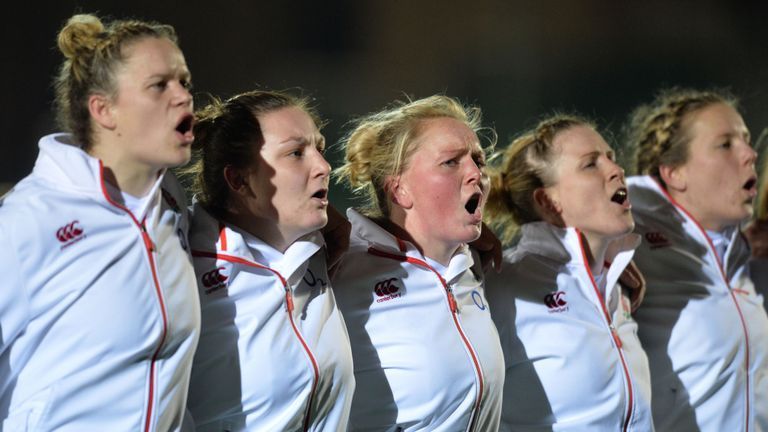The RFU Announce Plans To Bid For 2025 Rugby World Cup
October 25, 2021
Since England last hosted the RWC in 2010 and won it in 2014, women’s rugby has grown exponentially with World Rugby stating the women’s game is the single biggest opportunity to grow the sport globally.
The Red Roses are the number one ranked team in the world and the RFU has grown female participation in England from 13,000 to 40,000 registered players in clubs, with a growing pipeline of 80,000 girls playing in schools, colleges and universities.
“Securing RWC 2025 would add to the impressive list of major sporting events that the UK has attracted since London 2012 reinforcing the UK’s international reputation as a leading major events’ destination and a global leader in promoting women’s sport,” said RFU Chief Executive, Bill Sweeney.
“As well as providing great economic returns, hosting the tournament would help to further promote rugby as an inclusive sport and provide a springboard to narrow the gap between male and female participation.”
For the 2025 bid The RFU plans to adopt a multi-city and multi-region approach to delivering the tournament. This hosting model will facilitate great opportunities for people living in different parts of the country to attend the tournament, promoting rugby and enhancing participation in the sport nationwide.
A central theme to the bid will be to deliver a legacy programme in parallel to the tournament from 2022 to 2025 for growing the women’s game across the country. The legacy programme will focus on three key strands: Creating capacity through facility development and the recruitment of female coaches and referees, creating a multigenerational legacy through a call to arms for more young girls and University women to play, and for women who didn’t have the opportunity to play to become fans, and to support international development within the home unions.
The legacy programme will see facilities standards improved to enhance the experiences females have in hundreds of clubs through investment in facilities the programme will modernise toilet facilities, upgrade changing rooms and develop social spaces in clubs across the country.
Grassroots education and mentor programmes will aim to attract 500 new female coaches, 1,000 match officials and 60,000 new registered players.
Through partnerships with universities the legacy program will recruit and retain players and plans to create 300 club leaders of the future with activities including the staging of a Festival of Rugby event engaging 2,500 students and 150 club transition events.
With the aim of attracting more fans of women’s rugby in the build up to 2025 renewed effort will be put on marketing and encouraging fan attendance at Allianz Premier 15s matches and club houses will be opened up to hosting female events to encouraging women who have never played or watched rugby to see rugby clubs as a place they would like to visit.
The RFU is also committed to growing the English game leading into 2025 and has created two new roles to focus on implementing an ‘Every Rose Action Plan’.
International development will see investment into women’s elite rugby directed through the Home Unions to support the development of 120 female coaches and 30 female referees. The focus on female coaches and referees will improve the player experience across the Home Nations, with high level coaching fundamental to developing competitive players and top-level match officials necessary to facilitate a high-quality league and support the growth of an underrepresented cohort in elite rugby. The long-term ambition is to drive up standards in the domestic teams to enable England, Scotland, Wales and Ireland to all qualify for RWC in 2029 for the first time in over 20 years.
A study by Sheffield Hallam University’s Sport Industry Research Centre (SIRC) demonstrated hosting the RWC in 2025 would be of benefit to the local economies of host venues around the country through job creation as well as services provided and the RWC could boost the economy by £156.25m with projections of an economic return of £5 for every £1 invested.
The Legacy Programme could generate an estimated £86m. The values attributed to the legacy programme are based on increasing female participation in rugby and volunteering in the sport, combined with evidence on the contribution of community sport and physical activity in England to the five outcomes identified in the UK Government strategy for sport.
Sue Day, RFU Chief Operations and Finance Officer and former England Women’s Captain who represented England at three World Cups and won three grand slams said: “Securing a bid to host the Women’s RWC would be incredible. We want to leave a lasting legacy for women’s rugby in England the UK and across the world, both in terms of attracting more people to play and attracting new fans. As we have seen from other home World cups in Cricket, Hockey and Netball a RWC would further advance all women’s sport and nothing would beat watching the Red Roses compete in front of a full capacity crowd at Twickenham Stadium.”
Subject to securing sufficient private and public sector funding, the final bid submission will go to World Rugby for consideration in January 2022.

